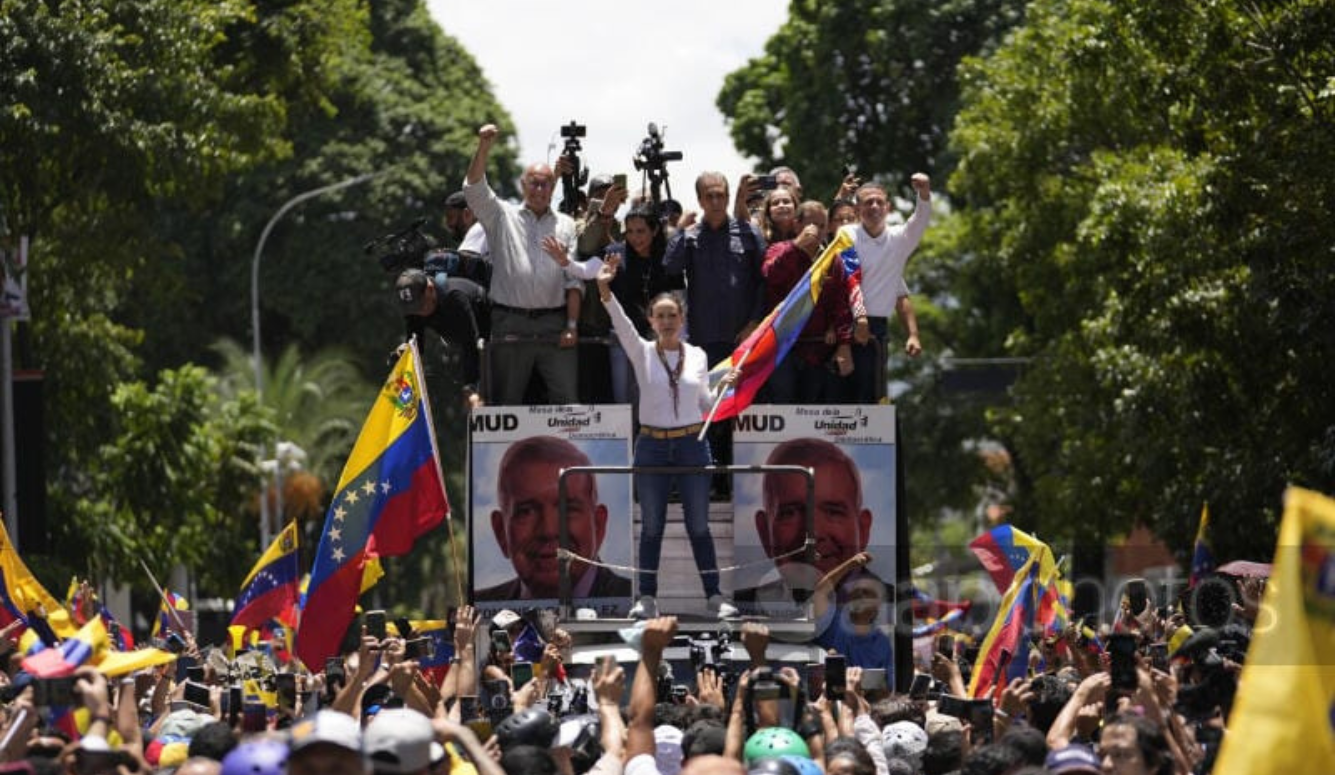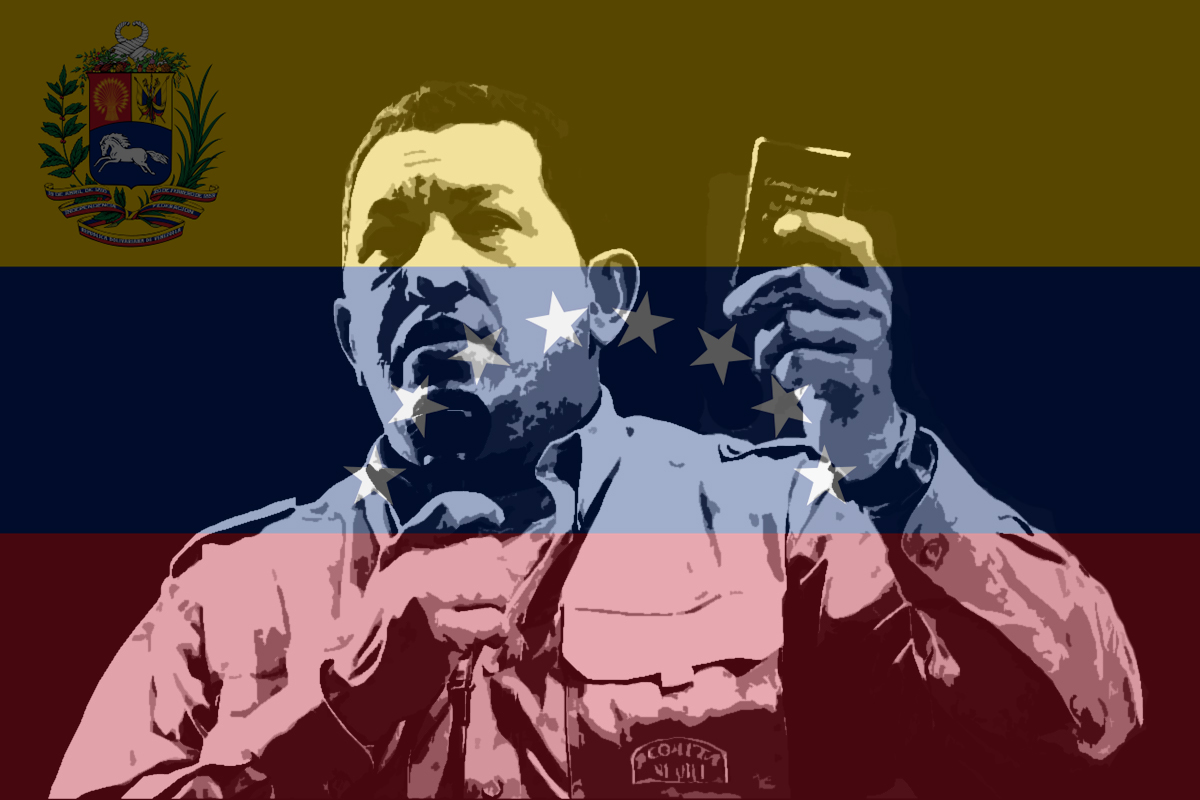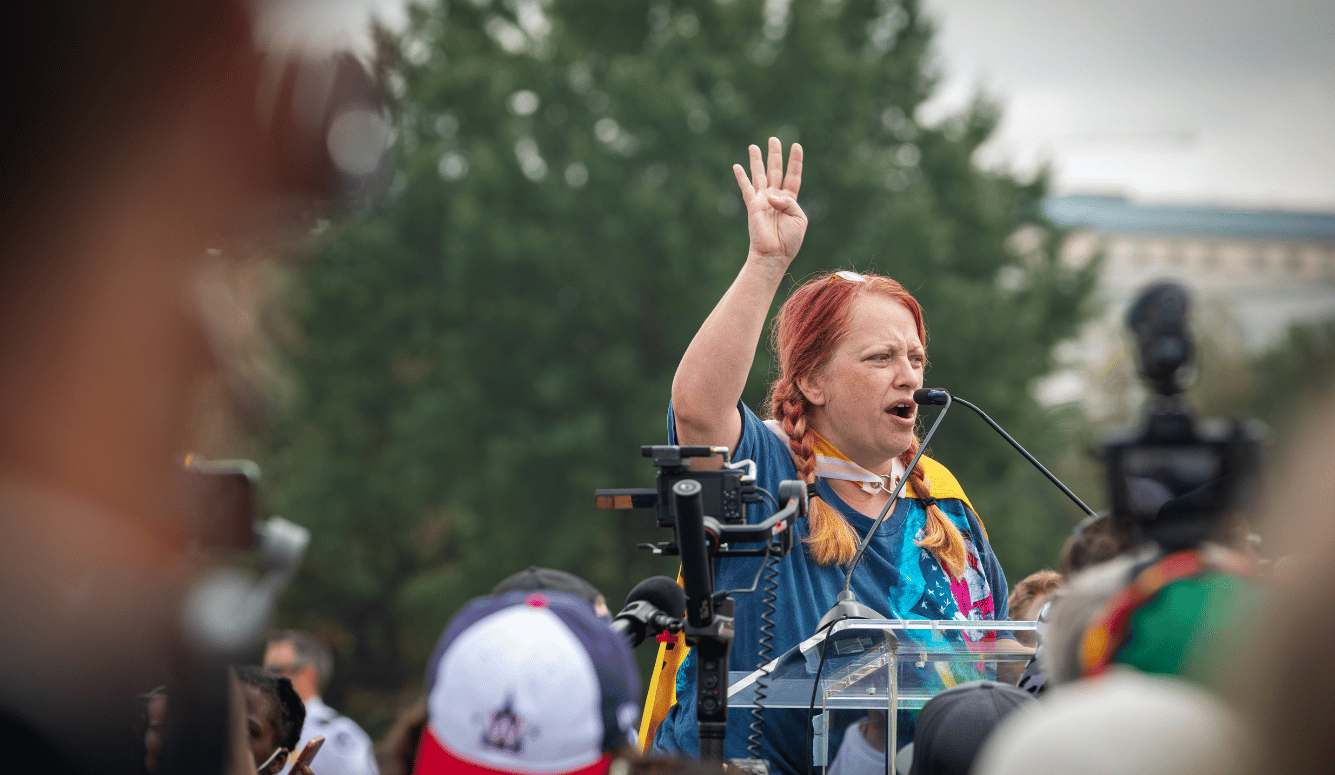Politics
Is De-Chávezification Underway in Venezuela at Last?
Venezuelans have had enough of Chavismo, and in Maria Corina Machado, they finally have an ideological alternative.

Hugo Chávez, the legendary socialist leader who preceded Nicolás Maduro, has long been a mythical figure. With his signature red beret and bombastic speeches, the man is to the West’s college Marxists what Justin Bieber once was to teenage girls. Some of this process has been organic—Chávez was indeed an icon, after all, and a person can be iconically awful. But much of the late leader’s mythologisation has been the result of an organised and persistent propaganda effort managed by adept political operatives, instructed by Cuba’s revolutionary regime, and exported by its backers.
Like the Soviets, the Chavista regime understood the importance of symbolism. They changed the official name of the country and its states; they changed their nation’s flag and shield; they added a little red heart and the words Hecho en Socialismo to the products of the companies they expropriated; they elevated historical figures like tribal leader Cacique Guaicaipuro; and they reimagined Simón Bolívar, the oil-rich country’s independence hero, as a Chavista God and made Chávez his son. They even remade Bolívar in the image of their revolution. The man whose portrait now hangs in public schools and government buildings looks nothing like the one painted more than two centuries ago.
Maduro and his allies still talk about Chávez in quasi-religious tones, calling him an “intergalactic” figure and the “eternal commander.” While I was on a Catholic mission more than eight years ago, I even saw a public school mural in a small isolated town close to Caracas that depicted Bolívar holding baby Chávez in his arms just as the Virgin Mary carried her infant messiah. In 2013, the year Chávez died, Maduro declared that his predecessor had appeared to him as a tiny bird to bless his presidential campaign. “I felt him there as if giving us a blessing, telling us: ‘Today the battle begins. Go to victory. You have our blessings.’ That’s how I felt it from my soul,” Maduro announced as he sat with Chávez’s siblings on the patio of the former president’s childhood home in the state of Barinas.
This carefully crafted messianic story would surely have made St. Paul blush, but it allowed Chavismo to penetrate the national psyche. While not all Chavistas became devotees, stories of his achievements attracted a loyal following. With the image of a reborn Bolívar fighting the satanic forces of US imperialism, Zionism, and so on, the regime successfully forced a self-serving and ludicrous narrative down the throats of its own people. The cult of Chavismo points to the immense welfare programs and other regional projects he financed with his country’s oil wealth, but these were not acts of Christian charity.
The welfare checks came with strings attached. You want a home? Food? Running water? Display your loyalty. The regime alleges that one of these social projects, the Gran Misión Vivienda Venezuela (GMVV), was responsible for building close to five million homes. But those numbers have attracted a great deal of dubious scrutiny, and like the more recent CLAP food-distribution program, the use of the GMVV to extort political support has been widely documented. “Unappreciative” and “treacherous” citizens have their government assistance rescinded, which creates dependence and incentivises loyalty to the regime.
In short, under the leadership of Chávez and Maduro, Venezuela became one of the most dangerous and corrupt countries on Earth. The nation that once welcomed John F. Kennedy and was regarded as South America’s best hope has become an economic basket case and a world leader in inflation. Nevertheless, for the last 25 years, fighting the Chavistas’ grand narrative has not been easy. Following Chávez’s death, indoctrination efforts accelerated. He quickly became the second most statued man in the country after Bolívar. Students began receiving even more Chavista homework from their Chavista teachers after the education ministry added Chavismo to curricula shortly after his passing, and schools filled their walls with portraits of Chávez.
But after years of growing unrest and gathering repression, the Venezuelan people seem to be ready to crucify their messiah. The immediate catalyst has been one of the most egregious instances of electoral fraud in recent history. After Maduro prematurely announced that he had beaten opposition candidate Edmundo González Urrutia by a seven-point margin, the people took to the streets in larger numbers than we have seen in ten years. So brazen was the theft that even continental left-wingers like Chile’s Gabriel Boric have denounced it, while other regional socialists like Colombia’s Gustavo Petro and Brazil’s Lula da Silva have issued vaguer calls for democracy.

Protests have snowballed into something like a cultural counter-revolution, as the outraged citizenry begins its own de-Chávezification project. In the cities of Calabozo, Los Teques, Coro, La Guaira, Las Tejerías, statues of Chávez have been pulled down, vandalised, and dismembered. (A statue on Margarita Island still stands, but only because it is being guarded by the authorities.) A man was recorded dragging the head of one of Chávez’s statues behind his motorcycle as he rode through his impoverished neighbourhood while ecstatic protesters clattered their pots and pans in a cacerolazo (a popular protest practice in Venezuela). There are dozens of videos circulating online of Venezuelans tearing down Maduro posters, burning signs, and destroying portraits. Some or the country’s poorest citizens—the very people Chavismo claims to protect and serve—now find themselves energetically desecrating the image of the man they were instructed to worship.
🇻🇪 | AHORA: Derriban una segunda estatua de Hugo Chávez, en Calabozo, estado Guárico, Venezuela. pic.twitter.com/NUsveKPKg7
— Alerta News 24 (@AlertaNews24) July 29, 2024
While the likelihood of regime change remains uncertain, scenes like these have electrified Chavismo’s opponents, and there is a widespread and growing feeling that something bigger is at stake this time around. Although statues have been pulled down by protesters before, the ferocity of the anger on display in these viral videos is new. More than eight million Venezuelan citizens (close to 25 percent of the population) currently live abroad, and they too are rejoicing as they watch events unfold on their televisions, laptops, and mobile devices.
For decades, regime opponents like the 2006 presidential candidate Manuel Rosales and the 2012 presidential candidate Henrique Capriles tempered their attacks on Chávez’s brand of socialism. After Chávez passed away, some segments of the opposition even embraced his mythology, and while many of them did so in the interests of electability, others were motivated by left-wing impulses of their own. Back in 2013, for instance, Capriles attacked “fake socialists” who he alleged were disgracing their late leader’s noble legacy. “They talk of socialism, but it’s on the surface only. Look how those well-connected ones live, what they wear, what cars they go round in, how many bodyguards they have,” Capriles said. More recently, some opposition activists have borrowed “anti-imperialist” arguments from Chavismo.
There really were no right-wing figures in the opposition before Maria Corina Machado rose to become its leader. Until very recently, the opposition playbook relied heavily on “Chavismo-light”—Maduro was criticised for his authoritarianism, but substantive critiques of socialism were absent. This has now changed. Swaths of the opposition who previously dismissed Machado as divisive and unelectable have flocked to her cause. This formidable and courageous woman was barred from running by Maduro, but the Spectator has speculated that she may yet become Venezuela’s Margaret Thatcher. For the first time, Venezuelans are being offered a robust alternative to socialism.
BREAKING:
— Visegrád 24 (@visegrad24) August 3, 2024
Opposition leader María Corina Machado organises a huge protest rally in Caracas
Hundreds of thousands of people are out on the streets of the Venezuelan capital
The Maduro regime is also mobilising. A crackdown could start soon
Via @UHN_Plus pic.twitter.com/9CAMtBYUSM
In October, to the dismay of the Chavismo-light strategists, Machado won the opposition’s primary with an astonishing 93 percent of the vote and then took over the opposition’s infrastructure. Her emphasis on liberty is reflected in the “¡Libertad!” chants at her rallies, and she is calling for a moral revolution. Machado’s unapologetic anti-Chavismo and strident public defence of classical liberalism have no doubt played a role in galvanising the current protests. Whether or not one agrees with her ideas, it has long been evident that the opposition needed its own philosophy if it was to overthrow Chavismo, and this iconoclastic “radical,” who once called Chávez a thief to his face, has managed to unite the country behind her mission to purge Venezuela of its crumbling orthodoxies.
Maduro announces the creation of two maximum security prisons for political prisoners. He says that they will be re-education camps and include forced work.
— Daniel Di Martino 🇺🇸🇻🇪 (@DanielDiMartino) August 1, 2024
Venezuela is now a Stalinist police state.pic.twitter.com/9hMMfj5VUG
Things will get uglier in Venezuela as Maduro ramps up the regime’s oppression. But whether or not Machado’s placeholder Edmundo González succeeds in replacing Maduro, a cultural battle for Venezuelan minds is at last being fought. The working-class constituency on which Chávez and his lieutenants once relied to secure their power is now marching down from the hills and slums into the plazas of Caracas to express their anger and disenchantment. They have endured lies, hunger, and violence but accepted the excuses of a regime that blames every social ill on the “fascists” and the “Yankees.” Now they have had enough. Things have changed, the protesters can be heard to say, and “Venezuela ha perdido el miedo” (“Venezuela has lost its fear”).
Were Maduro not still tightly guarded in the Miraflores Palace, he would surely be lynched by the same people who once loved El Comandante. But a tipping point has not yet been reached. For Venezuela to close this perilous chapter in its history, the military will need to abandon the regime. For now, such a development remains uncertain, not least because Maduro has invested heavily in making his army revolution-proof. But Machado isn’t about to give up. “We will fight until the end,” she promises in all her public appearances, and she seems to mean it. That is why her supporters refuse to let this opportunity pass. It’s now or never.






